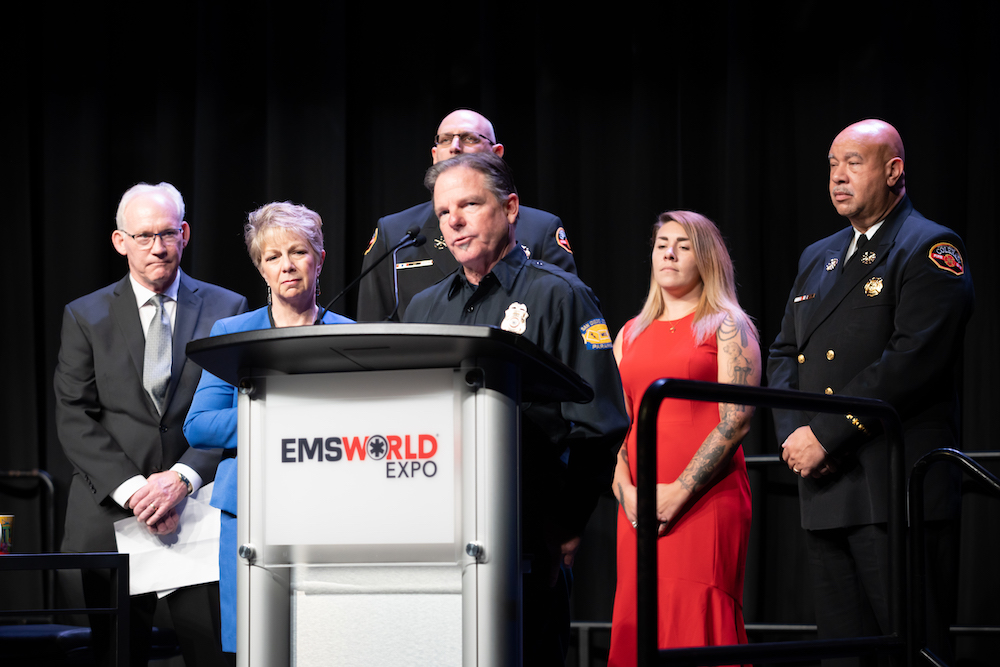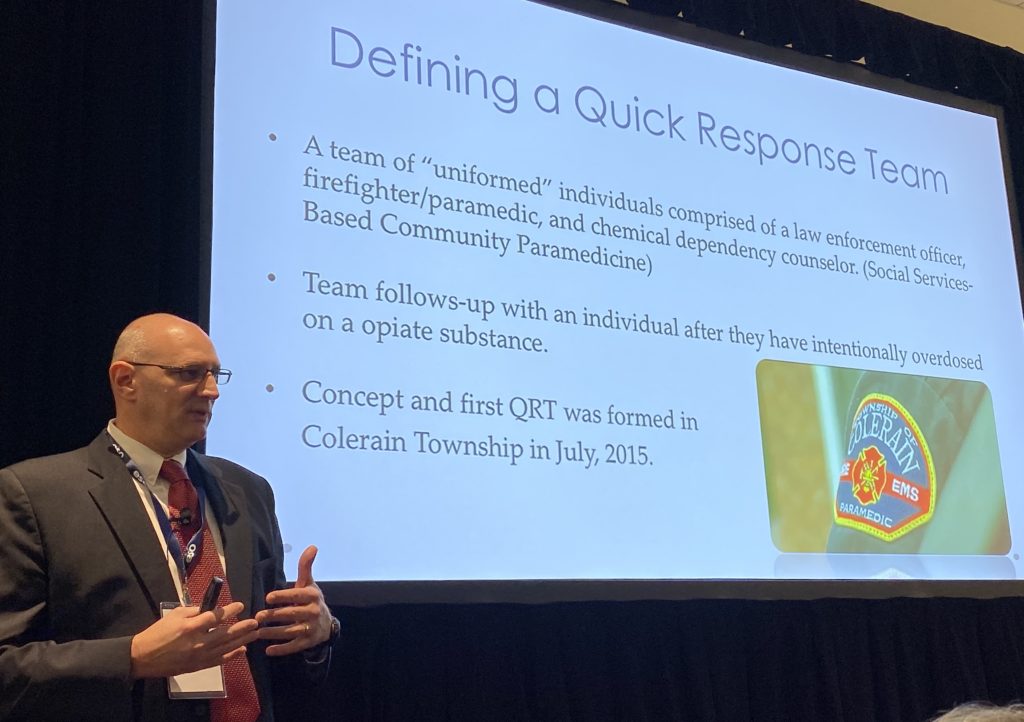November 1, 2019

California Paramedic Foundation co-founder Paul Maxwell presents the 2019 Nicholas Rosecrans Award to Colerain Fire and EMS at the EMS World Expo in New Orleans, LA.
As the United States continues a hard-fought battle against the current opioid epidemic, many communities around the nation are finding incredible value in the prevention capabilities of their EMS providers. Paramedics and EMTs—who are the frontline responders in many opioid overdose cases—often have unparalleled opportunities to establish relationships with overdose survivors and get them critical preventative resources and assistance. This year, the California Paramedic Foundation recognized just such a program being operated by the Colerain Township Fire and EMS Department.
The Foundation conferred its national Nicholas Rosecrans Award for injury and illness prevention to Colerain during the keynote address at the 2019 EMS World Expo in New Orleans in front of thousands of EMS practitioners and leaders from around the country and world. As part of the awarding, Colerain Fire and EMS presented during the seminar teaching how others might implement successful prevention programming in their region.
Colerain’s incredibly successful program reflects a paradigm shift throughout the country in which EMTs and paramedics—often as a part of multidisciplinary teams—try to prevent 911 incidents before they happen. The Township’s program was born out of the personal experience of Colerain Assistant Chief Will Mueller’s 911 responses to local drug overdoses. During his presentation to attendees, Chief Mueller recalled the final precipitating event leading to his creation of the Colerain program.
“I went on an overdose response for a young woman. I found her curled up in the corner of a room with a friend at her side. This woman was someone’s daughter or sister. It could have been my daughter. The worst part was a friend of the victim was present throughout the whole ordeal and could have activated 911 but was too afraid. I knew we had to do more,” said Mueller, as he shared with the group.

Assistant Chief Will Mueller led a session at the EMS World Expo to teach attendees about their highly successful opioid use disorder prevention programming.
Since that event, Chief Mueller and Colerain Fire and EMS have worked to address the opioid crisis through multifaceted prevention programming. Their efforts include a “Safe Station Program” offering round-the-clock resources at each fire station, educational materials in the hands of frontline EMTs and paramedics, and a multidisciplinary quick response team (or QRT). The QRT consists of a fire-paramedic, a chemical dependency specialist, and a police officer who work together directly with at-risk individuals identified through 911 incidents.
To date, their programming has viewed by many as highly successful. The team has had a 72% success rate in helping more than 350 individuals enter into substance abuse treatment. As a direct result, the Colerain Fire and EMS Department have seen a 70% reduction in 911 requests for opioid overdose.
At the heart of Colerain’s high impact programming is the idea of “meeting patients where they are.” The EMS Agenda 2050, a national document providing a vision for the future, refers to this as people-centered care and has identified it as a transformative idea in the way our country delivers out-of-hospital care.
Hannah Dawes—the Colerain QRT’s chemical dependency specialist—echoed this sentiment when she told the audience, “it is so important to develop a trusting relationship between all members of the team and then with those individuals in need of help wherever they may be. This relationship will serve as the foundation for any subsequent successful action plan and follow-up.”
“Prevention is the future of emergency medical services and paramedicine,” states Paul Maxwell, founder of the Nicholas Rosecrans Award and a Director at the California Paramedic Foundation. “It is flipping traditional EMS on its head with paramedics working ahead of 911 calls to reduce injury and illness in their communities. We are incredibly proud of Colerain Fire and EMS for the impact they have had on their township.”
The Nicholas Rosecrans Award is conferred to individuals and organizations who create EMS-driven injury and illness programming. The award is named after a young toddler whose tragic drowning helped drive critical prevention programming in California. The award is facilitated by the Foundation in partnership with EMS World—the leader in paramedicine meetings, content, and education—and RedFlash Group—the leading EMS consultancy specializing in emergency communications and care professions.


